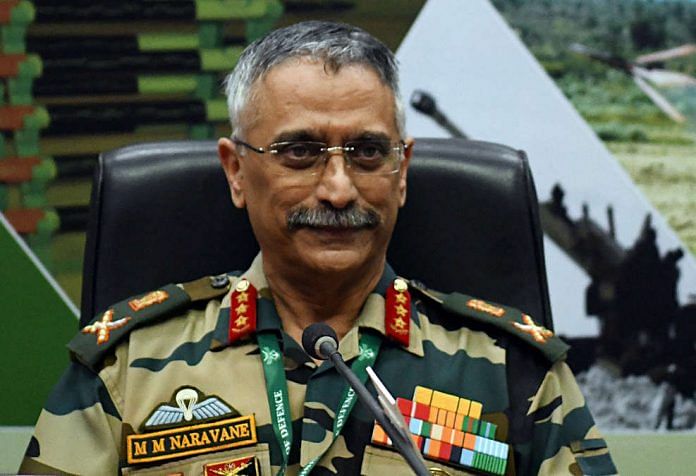New Delhi: Indian Army officers describe Lieutenant General M.M. Naravane, the next Chief of Army Staff, as a “thoroughbred infantryman, great listener, soldier-centric and well-read”. The decorated officer from the Sikh Light Infantry regiment is set to take over as the Army chief in two weeks.
Most senior among all contenders, Naravane will take over the reins of the 1.3 million-strong force after present Army Chief General Bipin Rawat retires from the position on 31 December, the Army said in a statement Monday.
He will be among the few Army chiefs to have commanded a strike corps on the western border and a Rashtriya Rifles (RR) battalion. Before taking over as the Vice-Chief of Army from September this year, he had also led the crucial Eastern Command and the Army’s training command ARTRAC in Shimla.
Naravane’s tenure will be for a period of two years and four months.
Also read: What should role of Chief of Defence Staff be? Experts debate as India gears up for CDS
‘Believes in a soldier-centric approach’
Officers who have served with him and have known him closely describe Lt General M.M. Naravane as a “thoroughbred infantryman”.
“He speaks little, but is a great listener,” an officer who has served with him in several key appointments told ThePrint. “Also, he is an avid reader and reads a variety of literature.”
A second officer who has worked with him closely emphasised that he is extremely well-read and has thorough knowledge of Myanmar, Bangladesh and China.
“He is thorough on the eastern border — the geographies, mindsets of the people and their likely responses in various contingencies…” said the officer who didn’t wish to be named.
The second officer said Naravane has always been extremely dignified in the articulation of his views, without being aggressive or dismissive of others. He takes a patient and genuine view of his subordinates, takes everybody on board while making a “quality decision” and never shies away from taking a stand where needed.
“An important quality of his is that he is low on extravaganza and believes in a soldier-centric approach as compared to the erstwhile feudal officer-centric approach,” the officer said.
Lt. Gen. Satish Dua (Retd), former chairman of the Chiefs of Staff Committee of the Indian Armed Forces, described Naravane as a “balanced person who is open to all viewpoints”.
“He is soft spoken, yet firm. He will ensure that he listens to all viewpoints before making a final point,” said Dua.
A third senior Army officer said Naravane’s experience as defence attaché in Myanmar for three years will contribute a long way in drawing up a long term plan of engagement with one of India’s strategic neighbours.
“His experience in commanding a strike corps on the western border and as the eastern army commander also makes him clear about both India’s western and northern borders as well as the Northeast imbroglio,” the third officer said.
“Moreover, having commanded a RR battalion, he has been in the thick of counter insurgency environments,” added the officer. Naravane has served as part of the Indian Peace Keeping Force in Sri Lanka.
Dua said given Naravane’s experience with the Ministry of External Affairs during his Myanmar term, and with the Ministry of Home Affairs during his Assam Rifles (North) posting, would give him a 360-degree view of defence and strategy.
As the chief of the force, Naravane will have the big task of overseeing the restructuring of Army headquarters, a massive exercise started by Gen Rawat.
‘Same NDA course as two other service chiefs’
Lt Gen M.M. Naravane is from Pune. He is the son of late Sudha Naravane, who was a noted Marathi short story writer and a news broadcaster with the All India Radio centre in Pune. His father Mukund Naravane had served in the Indian Air Force (IAF).
An alumnus of the National Defence Academy (NDA) in Pune and the Indian Military Academy in Dehradun, Naravane was commissioned into the 7th battalion of the Sikh Light Infantry regiment in June 1980.
He holds a masters degree in defence studies, an M.Phil in defence and management studies and is currently pursuing a doctorate.
Once Naravane takes over as the chief, all three current service chiefs — Navy chief Admiral Karambir Singh and IAF chief Air Chief Marshal R.K.S. Bhadauria — will be from the same 56th NDA course.
In a rare situation like this when all the three chiefs are course mates from NDA, it’s likely to enhance tri-services synergy and help in a smooth transitioning when the Chief of Defence Staff is announced, Dua said.
One of the officers quoted above said this will facilitate a better understanding between the chiefs. “And all three being nearly fresh in their appointments, we could see the services stand together for some time.”
Naravane is also the third Sikh LI regiment officer to serve as the Army chief — the other two being General Bikram Singh (Retd) and General Ved Prakash Malik (Retd).
Also read: Indian Army’s new cadre review will create more problems than resolve




It will be a relief to have a COAS who speaks little.